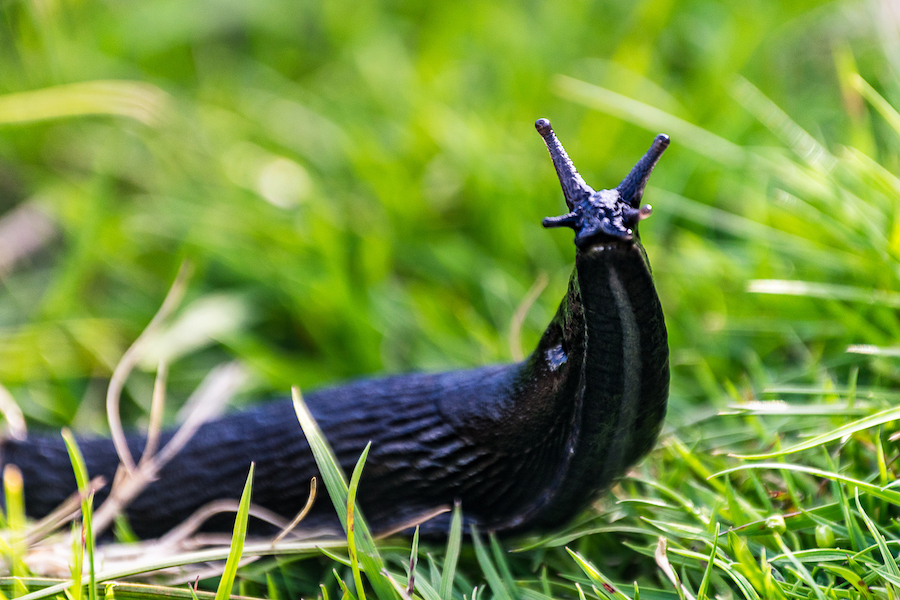8 less toxic tips for keeping slugs at bay
It’s a well-established fact that slugs can be a bit of a pest. However, from 1st April 2022, metaldehyde slug pellets are banned – so what are the alternatives for dealing with them?
Plant pathologist and organic gardener Pippa Greenwood, a regular on BBC Radio 4’s Gardeners’ Question Time, says: “There are plenty of other really effective things you can do to deter slugs. The best option is to take a multi-pronged attack.”
Here, Pippa Greenwood makes some suggestions…
1. Create barriers
Greenwood uses copper tape, widely available at garden centres, around the rims of containers and the walls of raised beds, which act as a deterrent. “Occasionally, a slug will get in, but in the main copper tape helps hugely,” says Greenwood.
Other barriers, such as cloches, can also be placed over young vulnerable plants.
2. Block their path with mulches

Use pine needles as a mulch (Thinkstock/PA)
Crushed shells are a good mulch, says Greenwood. Poultry suppliers generally have an amount of crushed oyster shells and will be cheaper than buying a small box of crushed shells from a garden centre, she says. “Use the shells as a surface mulch around vegetables including purple sprouting broccoli and calabrese.”
The resin of pine needles, as well as the spikiness, can also deter slugs. Mulch the needles right up to the stem of plants, as then underground slug species such as keel slugs, which spends much of its time underground.
3. Encourage natural predators
Tempt natural predators who feed on slugs and snails into your garden, such as ground beetles, frogs, toads, hedgehogs and birds. Provide a variety of wildlife habitats and nesting boxes.
4. Choose resistant vegetable varieties

Pippa Greenwood tries out disease-resistant varieties
Some varieties of potato tuber, for instance, are particularly resistant to soil dwelling slugs, says organic gardening charity Garden Organic (gardenorganic.org.uk). These include Ambo, Cara, Desiree, Romano, Sante and Valor.
5. Choose trouble-free plants

Slugs are less likely to go for agapanthus
Garden Organic recommends gardeners choose plants that slugs and snails don’t like, including Acanthus mollis, agapanthus, hardy geranium, Digitalis purpurea, Nepeta x faassenii, Papaver orientale, Rudbeckia fulgida and Sedum spectabile.
6. Keep your soil structure and drainage sound

Make sure soil is well-raked
Slugs thrive in rough, lumpy ground which is poorly drained, so improving drainage and soil structure is important where these conditions occur. Adding grit can help drain heavy and compacted soil.
If you rake to create a fine tilth before sowing, you’ll help to disturb slugs and their eggs, as well as helping soil to dry out on the surface, making movement more difficult for them, Garden Organic points out.
7. Be vigilant
Inspect vulnerable plants regularly and remove any pests. Put on a pair of rubber gloves and go out in the garden after rainfall and at night, when slugs and snails feed.
8. Keep the garden reasonably tidy

Tidy up old flower pots
Don’t give slugs hiding spaces by leaving piles of rubble or stones or stacks of flower pots close to cultivated areas. If you find large populations of slugs or snails in a corner of a veg bed or up an adjacent wall, pick them off and dispose of them.
The Press Association
Latest posts by The Press Association (see all)
- 5 new books to read this week - November 23, 2024
- 3 easy Mary Berry recipes to make this season - November 22, 2024
- In Pictures: Party stalwart kept New Labour in touch with traditional supporters - November 21, 2024
- 6 easy indoor exercises to try this winter – and why they are good for you - November 19, 2024
- Martin Clunes: I can’t afford to retire – I’ve got too many horses - November 19, 2024





















